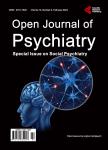Understanding the Etiology and Treatment Approaches of Schizophrenia: Theoretical Perspectives and Their Critique
Understanding the Etiology and Treatment Approaches of Schizophrenia: Theoretical Perspectives and Their Critique作者机构:School of Nursing San Diego State University San Diego CA USA
出 版 物:《Open Journal of Psychiatry》 (精神病学期刊(英文))
年 卷 期:2016年第6卷第4期
页 面:253-261页
学科分类:1002[医学-临床医学] 100201[医学-内科学(含:心血管病、血液病、呼吸系病、消化系病、内分泌与代谢病、肾病、风湿病、传染病)] 10[医学]
主 题:Schizophrenia Theory Neurobiology
摘 要:This paper reviewed genetic, neurodevelopmental, and neurobiological perspectives to understand the etiology and relevant treatment approaches of schizophrenia. Although genetic and neurodevelopmental theories provide a substantial contribution to the etiology of schizophrenia, neurobiological one has its dominant stance in which it can explain causative mechanisms of schizophrenia, identify targets for treatment, and predict outcomes well. According to the neurobiology, onset and course of schizophrenia are well supported by the alterations in neurotransmitters such as dopamine or serotonin. Based on this mechanism, antipsychotics have been widely used as one of the treatment approaches for schizophrenia. By following up the degree of patients’ responses to antipsychotics, treatment outcomes could be evaluated or predicted. Although neurobiology seldom provides information about identification or prevention of risk factors about schizophrenia compared to genetic and neurodevelopmental approaches, it has well-established scientific foundations, ability to guide treatment, applicability across age and culture, and usefulness as a research framework.



